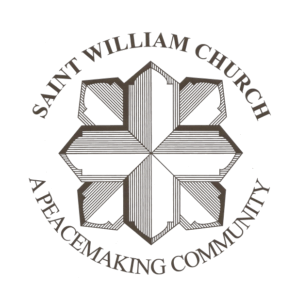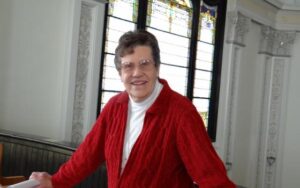Reclaiming Catholic History for our Daughters

Discerning Deacons Ellie Hidalgo and her nieces
Last week I presented the ministry of Discerning Deacons to seniors at Flintridge Sacred Heart High School at La Cañada, California. Thanks to an invitation from teacher Kristina Ortega and technology, I could visit three classes from my perch in Miami, Florida.
At a time when many young Catholic women in high school and college express immense frustration and discouragement with the institutional Catholic Church, the work of Discerning Deacons can ignite a spark of hope towards imagining a better future that includes women’s voices and gifts more fully.
It surprised these seniors to learn about the stories and evidence of women deacons in early Christianity. From the earliest Christian communities until the 12th century, women deacons baptized and anointed women, proclaimed the Gospel, preached, taught catechism to children, assisted at the altar, administered finances, assisted in marriage annulment investigations, and cared for women on the margins, especially those who were sick, poor or imprisoned. But this history is not what young people regularly learn in their religion classes. Why not?
Like the Hidden Figures of African-American women who made major contributions to the NASA space program, our Catholic history is also filled with hidden figures of women who embraced Christianity and changed the course of our salvation history. We are excavating our history and learning their names – Phoebe, Maria, Gregoria, Thedosia, Severa, Helaria, etc. And we point to the lands where they lived – Palestine, Asia Minor, Greece, Syria, Israel, Northern Africa.
It matters to me to speak to teens, because I have four remarkable young adult nieces who struggle to find their place of belonging in this faith (#MineToo). They’ve only ever lived in a Church reckoning with the clergy sex abuse crisis. They see other fields taking steps to recognize women in visible leadership roles – athletics, government, academics, medicine, business – and wonder why a religious institution founded by Jesus drags its feet on doing the same. They hear about new institutional changes to formally recognize women as acolytes and lectors, but wonder if this is too little too late for their generation to remain engaged.
So where are we as women pastoral ministers in this struggle? Admittedly, for many years my nieces saw me working at my much beloved parish championing the human dignity of immigrants, of people who are homeless, of formerly incarcerated women and men, of survivors of violence, of those struggling to lift themselves out of poverty. All of it meaningful and transformational. Yet, what my nieces didn’t see, was my also being engaged in a visible effort to not let another decade pass in which Catholic women’s voices remain muted. That is until we launched Discerning Deacons last year).
When 99% of Catholic Churches will have a male preacher this Sunday in a world where 50% of the population is women, it’s time for our daughters and granddaughters to see us naming out loud a problem we endure quietly in our hearts. Because what seemed normalized to my grandmothers, and became uncomfortable for my mother, and has become unacceptable for me, is unbearable for my nieces and for many of our daughters. They can’t find their place of belonging in this structure – and this will have untold consequences for our Church ministries.
So what kind of impact does knowing more of the history of early Christianity have on young women? Well, for one, it points to a more robust beginning for Christianity, one in which women played significant leadership roles and made essential contributions. It means that young women today get to knowingly stand on the shoulders of early Christian women who braved all manner of dangers to build a collaborative, circular, synodal Church and to witness Jesus’ liberating good news for men and women. It means that the fullness of our Catholic history reclaimed, stands a chance of shaping the present and a better future.


